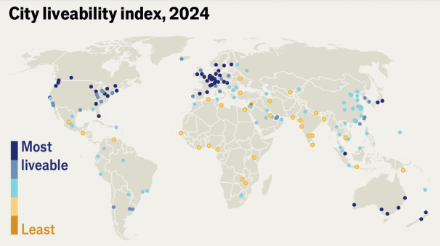Global Liveability Index 2024 (GS Paper 3, Economy)

Introduction
- The Economist Intelligence Unit (EIU) has unveiled its latest Global Liveability Index, once again naming Vienna, Austria, as the world's most liveable city.
- The 2024 index evaluates cities globally based on several critical factors, including education, healthcare, culture, environment, stability, and infrastructure, providing a comprehensive overview of urban liveability.
2024 Top Rankings Overview
- Vienna, Austria, continues to hold the top spot as the most liveable city in the world, a position it has maintained consistently due to its excellent public services, infrastructure, and overall quality of life.
- Following Vienna, Copenhagen, Denmark, remains in second place, showcasing its strong healthcare, education, and cultural offerings.
- Zurich, Switzerland, has ascended to third place, reflecting improvements in its public services and overall stability.
- Melbourne, Australia, previously third, has slipped to fourth place, yet it remains a highly liveable city with robust healthcare and educational systems.
- Calgary, Canada, and Geneva, Switzerland, share the fifth spot, highlighting their high standards in healthcare, infrastructure, and stability.
- Other cities that made it to the top ten include Sydney, Australia, and Vancouver, Canada, both tied at seventh place, and Osaka, Japan, and Auckland, New Zealand, both tied at ninth place.
Methodology Behind the Rankings
- The EIU’s Global Liveability Index evaluates cities based on five key areas:
- Education: Availability and quality of education, including the presence of international schools.
- Healthcare: Quality and availability of private and public healthcare services.
- Culture and Environment: Availability of cultural activities, climate, and green space.
- Stability: Prevalence of crime, threat of conflict, and level of civil unrest.
- Infrastructure: Quality of roads, public transport, housing, energy provision, and telecommunications.
- Vienna scored exceptionally well, achieving perfect scores in education, healthcare, stability, and infrastructure.
- However, it fell slightly in culture and environment due to a lower number of major sporting events compared to other global cities.
Regional Differences and Trends
- North America: North American cities generally scored well in education, with top-tier institutions and widespread availability of high-quality educational services. However, infrastructure issues, particularly related to housing crises in Canadian cities like Vancouver and Calgary, impacted their overall scores.
- Middle East: Cities in the UAE and Saudi Arabia experienced notable improvements in their rankings, driven by enhanced safety measures and significant investments in healthcare infrastructure. These advancements reflect ongoing efforts to improve living standards and attract international talent and businesses.
- Western Europe: Despite high rankings, Western European cities faced a decline in stability scores due to increased protests and crime rates. These socio-political issues have slightly impacted the overall liveability scores in this region.
- Israel: Tel Aviv saw a substantial drop in its ranking, primarily due to the ongoing regional conflict, which has affected the city's stability and overall safety.
Insights into Least Liveable Cities
- At the other end of the spectrum, Damascus, Syria, continues to rank as the least liveable city in the world, plagued by ongoing conflict and instability.
- Other cities at the bottom include Tripoli, Libya; Algiers, Algeria; and Lagos, Nigeria, where persistent socio-economic challenges and political instability contribute to low liveability scores.
The 10 Best Cities to Live in the World
- Vienna, Austria
- Copenhagen, Denmark
- Zurich, Switzerland
- Melbourne, Australia
- Calgary, Canada (tied with Geneva)
- Geneva, Switzerland (tie)
- Sydney, Australia (tied with Vancouver)
- Vancouver, Canada (tie)
- Osaka, Japan (tied with Auckland)
- Auckland, New Zealand (tie)
The 10 Worst Cities to Live in the World
- Caracas, Venezuela
- Kyiv, Ukraine
- Port Moresby, PNG
- Harare, Zimbabwe
- Dhaka, Bangladesh
- Karachi, Pakistan
- Lagos, Nigeria
- Algiers, Algeria
- Tripoli, Libya
- Damascus, Syria
Way Forward
- The Global Liveability Index 2024 provides valuable insights into the factors influencing urban liveability worldwide.
- Vienna’s consistent top ranking underscores its high standards in public services and overall quality of life.
- The index also highlights regional disparities, with cities in the Middle East showing significant improvements, while socio-political issues have affected cities in Western Europe and Israel.
Conclusion
- As urban environments continue to evolve, the Global Liveability Index serves as a crucial tool for city planners, policymakers, and residents to understand and address the factors that contribute to making cities more liveable.
- Continuous monitoring and evaluation are essential for enhancing global liveability and ensuring that cities can provide their inhabitants with the best possible quality of life.


